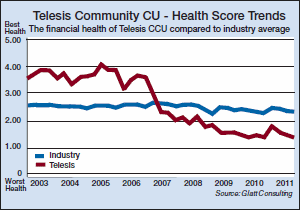Change is all but inevitable for Telesis Community Credit Union following the state’s decision to assign control of the ailing Chatsworth-based financial institution to the National Credit Union Administration. Observers say the federal agency will guide the credit union toward recovery, but in the event those efforts fail, Telesis likely will be positioned for liquidation or sale. The credit union has more than 37,600 members, branch locations in Canyon Country, Simi Valley and Westlake Village and employs 175 full-time workers. The California Department of Financial Institutions placed Telesis into conservatorship on March 23 following a period of continuous losses due to unpaid commercial real estate loans. Telesis suffered a 45 percent loss in its total assets in a three-year period. An aggressive lending strategy had the Valley institution as the lead lender for a shopping center in Florida, office buildings in Oregon and Georgia and other commercial developments in Tennessee and California. Some of the properties filed for bankruptcy. Paul Merski, chief economist with the Independent Community Bankers of America, said Telesis is the perfect case study to show the risks a credit union faces when it aggressively expands outside the area it directly serves and beyond the mission of serving people of modest incomes. “I don’t know how a strip mall in Florida is serving the community in California,” Merski said. Telesis is the third credit union this year that the federal agency has been assigned to control. The others are the People for People Community Development Credit Union in Philadelphia and A M Community Credit Union in Wisconsin. The NCUA named banking industry veteran Michael K. Mulhern as the interim CEO to replace Grace Mayo, who had been with the credit union for 25 years. “(Mulhern) has consulted for credit unions and other financial services companies and regulators,” said NCUA public affairs specialist John Zimmerman. “Mulhern also has a strong knowledge of credit union strategy, operations, and financial management.” Attempts to reach Mulhern were not successful. With the NCUA in charge of Telesis, the objective is to turn around the credit union and return it back to its members, said Keith Leggett, a senior economist with the American Bankers Association. “They are not always successful,” Leggett said. “Sometimes the conservatorship results in the credit union failing. In that case the NCUA will liquidate the institution and find a merger partner.” At the end of 2008, the lender had total assets of $584.4 million. By the end of 2011, it had total assets of $318.3 million and a net worth of $17.5 million, according to the most recent call report filed by the institution. The report listed Telesis as being undercapitalized due to its net worth ratio of 5.48 percent falling below the mandated 7 percent ratio. Many credit unions today are being hampered by delinquent commercial real estate loans, Leggett said, noting unions in Arizona, Texas and Oregon face similar challenges. Telesis performed well until early 2007 and then membership dropped off and earnings dried up. The following year loan delinquencies and charge-offs started to become a problem, said Tom Glatt Jr., a North Carolina-based consultant to the credit union industry. At the end of 2011, Telesis had delinquent loans totaling $29.8 million. Business loans to members and non-members that went unpaid for a year or more totaled about $18 million. Business loan charge-offs totaled $5.7 million in 2011. To put Telesis on solid financial footing the credit union can sell off those loans, Glatt said, adding that a sale frees up money set aside as a reserve to cover charge-offs and future losses. “My guess is they will work out the problem loans and find a way for the business owners to resolve their problems,” Glatt added. The number of delinquent loans, however, would make a merger potential partner take pause. “If you have an institution with a lot of financial distress, a partner does not want to take on that baggage,” Leggett said. Telesis has done more commercial loans than is typical of credit unions due to an exemption to a federally mandated 12.25 percent cap. Telesis received the exemption because it had a history of making business loans. A pending bill in the U.S. Senate would allow credit unions to make more business loans. Opponents to the measure, such as the Independent Community Bankers of America, are using Telesis as an example of why the law should not pass. “The bottom line is a policy argument,” Merski said. “Why are credit unions tax exempt if they are acting as commercial lenders?” The NCUA and others say the conservatorship will not impact operations. Telesis members will be able to continue conducing financial transactions. Deposits are protected by the NCUA up to $250,000. Telesis will continue to service loans originating from Business Partners LLC, a credit union service organization the institution co-owns. Business Partners is also based in Chatsworth. “It is still an institution,” Glatt said of Telesis. “There is no reason to panic.”
